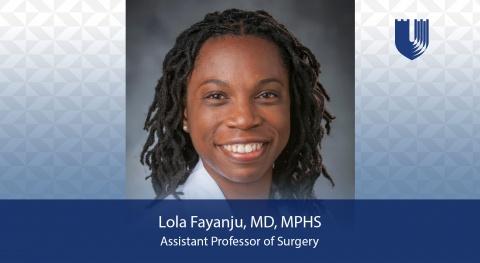
Lola Fayanju, MD, Assistant Professor of Surgery, Division of Advanced Oncologic and Gastrointestinal Surgery, presented her recent research at the American Surgical Association (ASA) Annual Meeting. Her research involved a review of 20,000 patients in the National Cancer Database, with a focus on the results of neoadjuvant chemotherapy and its link to overall survival rates.
Neoadjuvant treatments—those that occur prior to surgery—can eliminate the presence of active cancer cells. This scenario, called a pathologic complete response (pCR), is strongly linked to a more favorable overall survival rate. Dr. Fayanju’s research team studied whether achieving pCR in the breast tissue, the lymph nodes, or both was associated with overall survival. They concluded that a patient’s response to neoadjuvant chemotherapy is more strongly linked to cancer stage and the type of receptors found in the cancer cells. In addition, a patient’s response to neoadjuvant chemotherapy is a stronger indicator of overall survival than the stage of cancer.
The 138th Annual ASA Meeting was held April 19–21, 2018, in Phoenix, Arizona. Dr. Fayanju’s abstract is titled, “The Clinical Significance of Breast-only and Node-only Pathologic Complete Response (pCR) after Neoadjuvant Chemotherapy (NACT): A Review of 20,000 Breast Cancer Patients in the National Cancer Database (NCDB).”
Co-authors included Yi Ren, Samantha Thomas, Rachel Greenup, MD, MPH, Jennifer Plichta, MD, MS, Laura Rosenberger, MD, Nina Tamirisa, MD, Jeremy Force, DO, Judy Boughey, MD, Terry Hyslop, PhD, and E. Shelley Hwang, MD, MPH.